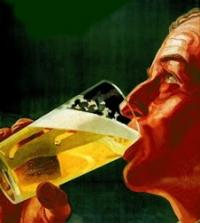It's also the type of thing that very few of us have the time to scope out. If we're going to dedicate time to making beer, we want good beer to show for it, not an experiment. But... you do have people out there willing to go to the ends of the Earth to shine a light on some of this (Kai comes to mind... Denny too) so that we can benefit from it.def a lot of bad information out there. claims are often made with no science to back it up.

mash steps by infusion
#21

Posted 22 January 2015 - 08:16 AM
#22

Posted 22 January 2015 - 08:23 AM
A question for you and Brauer, or anyone that can answer it.
Lets say make two beers from the same recipe and identical in process except for the mash schedule. The first is a mash is conducted with both a beta and an alpha rest, for example, a mash with steps at 145F for X amount of time and the raised to 158F for X amount of time. The second mash is just a single temperature infusion mash at say 152F. Both beers finish at 1.010 after fermentation.
What differences would one expect to discern between the two beers and why?
Hopefully Morty you don't mind 'cause I'm going to bump the above question again in case Brauer or others poke in here at some point and can answer the question.
#23

Posted 22 January 2015 - 08:24 AM
It's also the type of thing that very few of us have the time to scope out. If we're going to dedicate time to making beer, we want good beer to show for it, not an experiment. But... you do have people out there willing to go to the ends of the Earth to shine a light on some of this (Kai comes to mind... Denny too) so that we can benefit from it.
kai has done a lot of mashing experiments but I don't think this is one of them. I think he did do a decoction experiment but no step mash (sans-decoction).
Hopefully Morty you don't mind 'cause I'm going to bump the above question again in case Brauer or others poke in here at some point and can answer the question.
not at all - I'd also like to hear what he has to say.
Edited by Evil_Morty, 22 January 2015 - 08:24 AM.
#24

Posted 22 January 2015 - 08:44 AM
I sometimes wonder if my troubles in the past have been due to the cooler absorbing a lot of additional heat.
the way I currently strike in is to let the cooler and strike water get close to equilibrium and then put the grain in. I'm usually about +/- 0.5F of the temperature I was shooting for with this method. the downside with this method is I don't have a good sense of the thermal properties of my cooler.
Could be. The calculation has to take into account that you are working with a perfect insulator. It gets much more complicated if you don't. But, because a cooler is an insulator it should absorb heat much more slowly than a metal kettle.
The best thing you could do is put about 12 gallons of 140 degree water in your cooler (140 is the end temp). let it sit for a half hour with the lid closed as tight as you can make it. Then use the calculator to see how much boiling water you need to add to get to 152. Boil up some water and see if the calc was correct. If it's not then you are losing heat to the system somewhere, but you'll know how much, and you can account for that next time.
#25

Posted 22 January 2015 - 09:03 AM
Hopefully Morty you don't mind 'cause I'm going to bump the above question again in case Brauer or others poke in here at some point and can answer the question.
I'll take a crack at that one.
If the step mash was designed so that it got the same beer as the single infusion then there shouldn't be any discernible difference assuming all your other variables can be controlled (yeast count, O2, wort nutrients, ferm temp, water make up)
Honestly, I think anyone that says there's a difference that doesn't have commercial laboratory quality controls in place to make sure the other variables are held constant only has anecdotal evidence. Maybe their beer came out great when they did the step mash, but how many homebrewers make the same beer over and over and over and have blind tastings to see if there's a difference? Almost none.
Denny has spoken up about this before and has done some experiments, though his results are anecdotal as well, he couldn't discern a difference and he stopped doing step mashes.
That being said, step mashes are another tool in the box, and that's the difference between brewers and cooks. Brewers can make adjustments on the fly and change things as needed. Cooks follow a recipe. Being able to do a step mash because you missed your mash in temp is what makes you a brewer, so it's not a bad idea to practice them every now and then, or experiment so you know how efficient your boiled water addition will be.
Edited by SchwanzBrewer, 22 January 2015 - 09:21 AM.
#26

Posted 22 January 2015 - 09:06 AM
Also... a cook gets his results right away which makes it easier for them to 'test' and experiment. OTOH, our results take quite a bit longer to come in which makes it tougher.
#27

Posted 22 January 2015 - 10:06 AM
I don't have the data to give you a real answer. I started doing beta-alpha steps to solve 2 problems: less than complete conversion and beers that seemed sweet when they were mashed high for body. What I noticed appeared to be an easy solution to both my problems. My beers finished dry, but had a pleasant residual body. What may have happened, in part, was that starches that would have been unconverted at 150F, were converted at 160F.I have made beers at 158F and they actually don't seem as sweet to me as beers made just above 152F, so one untested possibility is that the profile of complex sugars is different in a beer that is mashed low, then high, with the low temp producing easily fermented sugars and the high producing dextrin that are complicated enough to not seem sweet. Perhaps intermediate temps produce a larger amount of intermediate products that can be perceived as sweet. That's mostly just hypothesizing, though. I believe strongly in the difference between systems, and my result may just be due to solving a conversion problem with my system. I don't think there's anything magic about that step, but it is one way to control body that was more successful for me than just raising mash temp.Basically, it's a really easy thing to do that makes beer I like but still gives me some control over body.Select your single temperature mash such that it matches the fermentability of the multi temp mash. At some given temperature you're going to get the same FG, no?Also how is it getting the additional body, assuming that is true?
#28

Posted 22 January 2015 - 10:14 AM
Basically, it's a really easy thing to do that makes beer I like but still gives me some control over body.
once I get the boiling water addition dialed in it should be a piece of cake. I already sparge as minimally as possible so I have no qualms about ending with a really thin mash. the limiting factor is my cooler more than anything. I never would have guessed that my coleman xtremem would have been a limiting factor when I bought it. I figured it would be bigger than anything I'd need except for the biggest beers. I'm finding myself now filling it to capacity on almost every beer I brew b/c I like to sparge with less than 3 gallons of water if at all possible.
#29

Posted 22 January 2015 - 10:26 AM
I don't have the data to give you a real answer.I started doing beta-alpha steps to solve 2 problems: less than complete conversion and beers that seemed sweet when they were mashed high for body. What I noticed appeared to be an easy solution to both my problems. My beers finished dry, but had a pleasant residual body. What may have happened, in part, was that starches that would have been unconverted at 150F, were converted at 160F.I have made beers at 158F and they actually don't seem as sweet to me as beers made just above 152F, so one untested possibility is that the profile of complex sugars is different in a beer that is mashed low, then high, with the low temp producing easily fermented sugars and the high producing dextrin that are complicated enough to not seem sweet. Perhaps intermediate temps produce a larger amount of intermediate products that can be perceived as sweet.That's mostly just hypothesizing, though. I believe strongly in the difference between systems, and my result may just be due to solving a conversion problem with my system. I don't think there's anything magic about that step, but it is one way to control body that was more successful for me than just raising mash temp.Basically, it's a really easy thing to do that makes beer I like but still gives me some control over body.
Great answer, thank you. More or less just evolving your process/system work for you and your tastes.
#30

Posted 22 January 2015 - 01:14 PM
#31

Posted 22 January 2015 - 01:17 PM
So most of you guys are talking about step mashing using boiling or near there water to raise the temp of your mash quickly. But if someone like me that uses a HERMS were to step mash I would just have to raise the temp setting of the PID to my next step and it would get there much slower than the quick addition of water. So what affects would that have let's say it took 20 min to get from 131 to 158?
I'm sure there would be some effect. If you were trying to match what someone else was doing with infusion I'd probably just start the ramp about 10 minutes before they would infuse. kind of split the ramp difference between the two rests. just a guess anyway.
Edited by Evil_Morty, 22 January 2015 - 01:17 PM.
#32

Posted 22 January 2015 - 01:23 PM
So most of you guys are talking about step mashing using boiling or near there water to raise the temp of your mash quickly. But if someone like me that uses a HERMS were to step mash I would just have to raise the temp setting of the PID to my next step and it would get there much slower than the quick addition of water. So what affects would that have let's say it took 20 min to get from 131 to 158?
I dunno. There's so much overlapping interaction going on. Seems like a wait and see kind of thing.
#33

Posted 22 January 2015 - 02:35 PM
something else I thought of - do the calculators account for some stirring of the mash? I assume after adding in the boiling water I should give it a quick stir to even things out.
#34

Posted 22 January 2015 - 02:50 PM
something else I thought of - do the calculators account for some stirring of the mash? I assume after adding in the boiling water I should give it a quick stir to even things out.
You are making the mash thinner and adding thermal mass, by the time you give it a stir I don't think you're losing much.
#36

Posted 23 January 2015 - 10:21 AM
Does anyone have a calculator they like? Any tips for someone that is more or less new to performing this procedure?
Since I know a lot of you use coleman xTreme coolers (70qt) does anyone have any information they'd like to share? In the past it always seems I undershoot but I haven't kept any reliable notes to figure out what I should be doing in the future since I do step mashes so infrequently.
Thanks all.
I have used many calculators and not one was able to accurately predict infusion temps and amounts. None of them seem to take the fact that the cooler resists temp changes into account. The best way to do it is to stir in boiling water and check the temp untikl you get to where you want to be. Or don't do them at all...IMO, a waste of time with no benefit to the beer.
A question for you and Brauer, or anyone that can answer it.
Lets say make two beers from the same recipe and identical in process except for the mash schedule. The first is a mash is conducted with both a beta and an alpha rest, for example, a mash with steps at 145F for X amount of time and the raised to 158F for X amount of time. The second mash is just a single temperature infusion mash at say 152F. Both beers finish at 1.010 after fermentation.
What differences would one expect to discern between the two beers and why?
I have dine that too many times to count and the answer is no discernable difference in a blind triangle tasting.
#37

Posted 23 January 2015 - 10:23 AM
I have used many calculators and not one was able to accurately predict infusion temps and amounts. None of them seem to take the fact that the cooler resists temp changes into account. The best way to do it is to stir in boiling water and check the temp untikl you get to where you want to be. Or don't do them at all...IMO, a waste of time with no benefit to the beer.
it's such a minor thing with my current process that if there is any chance it will make the final product what I'm going for it seems worth a shot. even if I miss the second temperature I'll still end up with beer.
#38

Posted 23 January 2015 - 10:25 AM
it's such a minor thing with my current process that if there is any chance it will make the final product what I'm going for it seems worth a shot. even if I miss the second temperature I'll still end up with beer.
Of cours
it's such a minor thing with my current process that if there is any chance it will make the final product what I'm going for it seems worth a shot. even if I miss the second temperature I'll still end up with beer.
Of course. But will it be better beer? Not in my experience.
#39

Posted 23 January 2015 - 10:27 AM
Will it be a different beer?Of coursOf course. But will it be better beer? Not in my experience.
#40

Posted 23 January 2015 - 10:45 AM
Will it be a different beer?
that's what I'm thinking - denny seems to think it makes no difference so at worst it was a minor amount of effort for nothing. best case I actually get something positive out of it.
0 user(s) are reading this topic
0 members, 0 guests, 0 anonymous users













